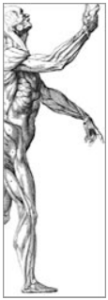
We visited an above average number of museums in 2005.
 Earlier in the year, we went to see
Body Worlds
at the California Science
Center in Los Angeles. These unusual exhibits use real bodies preserved
using plastination (a process that replaces tissue fluids with polymers),
artfully arranged to reveal the inner workings of the body. Whole
bodies, body systems, and body parts were on display, both healthy and
diseased. I finally got to see what a long head biceps tendon looks like
(the problem area in my own rotator cuff tendonitis).
There were even some animals on display, including a full size horse and
camel. It was all very fascinating, in a creepy sort of way (unlike the black
and white image at the right, the exhibits are in "living color").
You definitely come
away resolving to adopt a healthier lifestyle.
Earlier in the year, we went to see
Body Worlds
at the California Science
Center in Los Angeles. These unusual exhibits use real bodies preserved
using plastination (a process that replaces tissue fluids with polymers),
artfully arranged to reveal the inner workings of the body. Whole
bodies, body systems, and body parts were on display, both healthy and
diseased. I finally got to see what a long head biceps tendon looks like
(the problem area in my own rotator cuff tendonitis).
There were even some animals on display, including a full size horse and
camel. It was all very fascinating, in a creepy sort of way (unlike the black
and white image at the right, the exhibits are in "living color").
You definitely come
away resolving to adopt a healthier lifestyle.
I had neglected to bring a jacket so I bought the cheapest thing I could
find in the museum store, a sweatshirt with a periodic table of elements
on the front and an alphabetical list of elements on the back.
When I wore it to the Riverside Telescope Makers Conference
over Memorial Day, I was surprised to get several compliments on my attire
including, I kid you not, the list on the back. In fact, it was one of the
few times I remember being complimented on my taste in clothes.
One person even sought me out; he wanted to look up the atomic weight of
iridium (77) in order to remember the number of satellites originally
planned for the Motorola Iridium satellite system. It was an interesting
crowd. As someone noted, even a geek can feel closer to the center of the
bell curve there.
In July we visited the Mustard Museum in Wisconsin and the Spam Museum in Minnesota (see the Wisconsin road trip article).
In the fall, we saw physicist Graham Flintís "American Landscapes at 1000 Megapixels" exhibit at the Museum of Photographic Arts (MOPA) in San Diego. He designed a camera to use 9"x18" film, which he then digitized to resolutions as high as four gigapixels. At that resolution, a picture of an official size soccer field would have about 100 pixels per blade of grass.
A better way to understand this is to see his write up about the photo
"Paragliding over Torrey Pines".
After five successive croppings to 38%, the last image clearly shows three
people who are barely discernible as dots in the first image. The write up
also explains what the people are staring at on the beach.





In the MOPA exhibit, some prints were as large as 264"x44". Although they
were only printed one half to one third size, the clarity was almost like
looking through a window. Pretty amazing stuff.
Unfortunately, the gigapxl.org website no longer exists, but you can see it
archived on the
"way back machine" website.